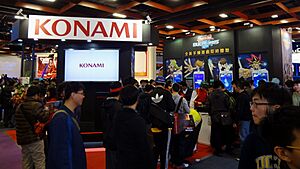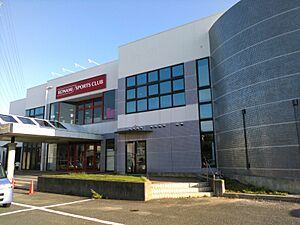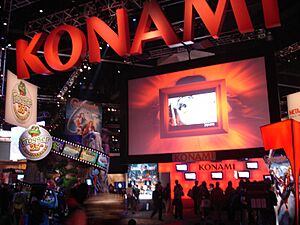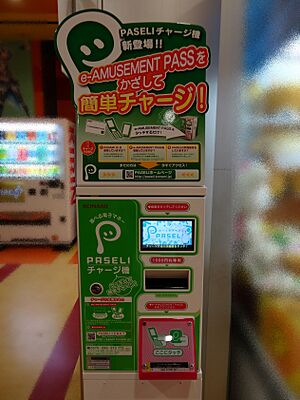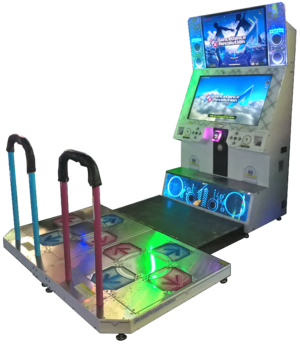Konami facts for kids
 |
|
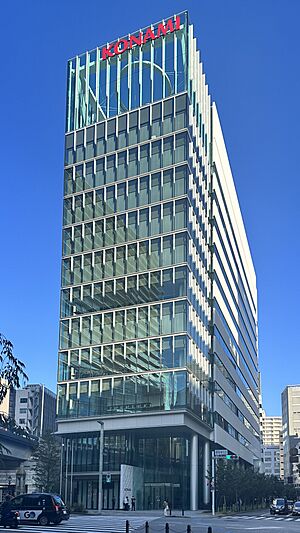
Headquarters in Ginza, Chūō, Tokyo
|
|
|
Native name
|
コナミグループ株式会社
|
|---|---|
|
Romanized name
|
Konami Gurūpu kabushiki-gaisha |
|
Formerly
|
|
| Public | |
| Traded as | |
| ISIN | ISIN: [https://isin.toolforge.org/?language=en&isin=JP3300200007 JP3300200007] |
| Industry |
|
| Founded | 21 March 1969 |
| Founder | Kagemasa Kōzuki |
| Headquarters |
Ginza, Chūō, Tokyo
,
|
|
Area served
|
Worldwide |
|
Key people
|
|
| Products | List of Konami games |
| Revenue | |
|
Operating income
|
|
| Owner | Kozuki family (29%) |
|
Number of employees
|
Konami (total) 8,941 (2022) Konami Digital Entertainment 1,874 (2022) Konami Amusement 872 (2022) Konami Sports 4,748 (2022) |
| Subsidiaries |
|
Konami Group Corporation (Japanese: コナミグループ株式会社, Hepburn: Konami Gurūpu kabushiki-gaisha), commonly known as Konami, is a Japanese multinational entertainment company and video game developer and publisher headquartered in Chūō, Tokyo. The company also produces and distributes trading cards, anime, tokusatsu, pachinko machines, slot machines, and arcade cabinets. It has casinos around the world, and operates health and physical fitness clubs across Japan.
Konami's video game franchises include Metal Gear, Silent Hill, Castlevania, Contra, Frogger, Tokimeki Memorial, Parodius, Gradius, Yu-Gi-Oh!, Suikoden, and eFootball. Additionally, Konami owns Bemani, known for Dance Dance Revolution and Beatmania, as well as the assets of former game developer Hudson Soft, known for Bomberman, Adventure Island, Bonk, Bloody Roar, and Star Soldier. Konami is the nineteenth-largest game company in the world by revenue. Konami also publishes the Yu-Gi-Oh! Trading Card Game, the best-selling TCG in history.
The company originated in 1969 as a jukebox rental and repair business in Toyonaka, Osaka, Japan, by Kagemasa Kōzuki, who remains the company's chairman. The name Konami is a portmanteau of the names of three founding members: Kagemasa Kōzuki, Yoshinobu Nakama, and Tatsuo Miyasako.
Konami is headquartered in Tokyo. In the United States, Konami manages its digital/arcade/trading card game business from Hawthorne, California, and its casino gaming business from Paradise, Nevada. Its Australian gaming operations are in Sydney. As of March 2019, it owns 22 consolidated subsidiaries around the world.
Contents
History
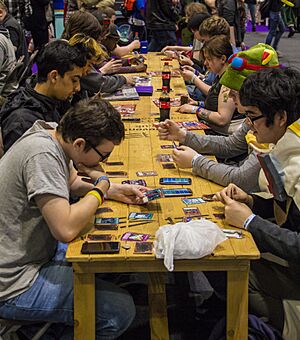
The company was founded on 21 March 1969 and was officially incorporated under the name Konami Industry Co., Ltd. (コナミ工業株式会社, Konami Kōgyō kabushiki gaisha) on 19 March 1973. The company's founder and chairman, Kagemasa Kōzuki (also known as Kaz Kozuki), ran a jukebox rental and repair business in Toyonaka, Osaka, before transforming the business into a manufacturer of amusement machines for video arcades. Their first coin-operated video game was released in 1978, and they began exporting products to the United States the following year.
Konami began to achieve success with arcade games in the early 1980s, starting with Scramble (1981), followed by hits such as Frogger (1981), Super Cobra (1981), Time Pilot (1982), Roc'n Rope (1983), Track & Field (1983), and Yie Ar Kung-Fu (1985). Many of their early games were licensed to other companies for US release, including Centuri, Stern Electronics, Sega, and Gremlin Industries. They established their U.S. subsidiary, Konami Inc. (later Konami of America Inc., and Konami Digital Entertainment Inc.), in November 1982; initially based in Torrance, California, they would later move to Buffalo Grove, Illinois, in 1984 following their acquisition of arcade distributor Interlogic, Inc., with Interlogic founder and president Ben Harel serving as president of Konami Inc. It was during this period that Konami began expanding their video game business into the home consumer market following a brief stint releasing video games for the Atari 2600 in 1982 for the U.S. market. The company released numerous games for the MSX home computer standard in 1983, followed by the Nintendo Entertainment System in 1985. Numerous Konami franchises were established during this period on both platforms, as well as the arcades, such as Gradius, Castlevania, Twin Bee, Ganbare Goemon, Contra, and Metal Gear, in addition to success with hit licensed games such as Teenage Mutant Ninja Turtles (TMNT). Due to the success of their arcade and NES games, Konami's earnings grew from $10 million in 1987 to $300 million in 1991. The first TMNT arcade game (1989) was Konami's highest-grossing arcade game.
In June 1991, Konami's legal name was changed to Konami Co., Ltd. (コナミ株式会社, Konami kabushiki gaisha) and their headquarters were relocated to Minato, Tokyo, in April 1993. The company started supporting the 16-bit video game consoles during this period, starting with the Super NES in 1990, followed by the PC Engine in 1991, and the Sega Genesis in 1992.
After the launch of the Sega Saturn and PlayStation in 1994, Konami became a business divisional organization with the formation of various Konami Computer Entertainment (KCE) subsidiaries, starting with KCE Tokyo and KCE Osaka (later known as KCE Studios) in April 1995, followed by KCE Japan (later known as Kojima Productions) in April 1996. Each KCE subsidiary created different intellectual properties such as KCE Tokyo's Silent Hill series and KCE Japan's Metal Gear Solid series (a revival of the Metal Gear series on MSX). In 1997, Konami started producing rhythm games for arcades under the Bemani brand and branched off into the collectible card game business with the launch of the Yu-Gi-Oh! Trading Card Game. Konami was not only known for its card games, it also imported into the Pachinko business. Pachinko played a huge role in Konami's success as it started to popularize new never before seen characters.
In July 2000, the company's legal English name was changed to Konami Corporation, but the Japanese legal name remained the same. As the company transitioned into developing video games for the sixth-generation consoles, they branched out into the health and fitness business acquiring People Co., Ltd and Daiei Olympic Sports Club, Inc. which became Konami subsidiaries. In August 2001, the company invested in another video game publisher, Hudson Soft, which became a consolidated subsidiary after Konami accepted new third-party shares issued by them. In January 2003, Avranches Automatique began handling sales of Konami's arcade games in Europe outside the U.K. and Ireland. On February 7, 2003, Betson Enterprises took over distribution and service for Konami's arcade games in the U.S. Some time later, PMT Sales started handling Konami arcade game sales in the U.K. and Ireland. In March 2006, Konami merged all their video game development divisions into a new subsidiary known as Konami Digital Entertainment Co. (KDE), as the parent company became a pure holding company. Their headquarters were relocated to Minato, Tokyo, in 2007. On January 20, 2009, Electrocoin became the exclusive distributor and after-sale agent of Konami's arcade games in Europe, Russia, the Middle East, and Africa.
The absorption of Hudson Soft in 2012 resulted in the addition of several other franchises including: Adventure Island, Bonk, Bloody Roar, Bomberman, Far East of Eden, and Star Soldier.
In April 2015, Konami delisted itself from the New York Stock Exchange following the dissolution of their Kojima Productions subsidiary. In a translated interview with Nikkei Trendy Net published in the following month, the newly appointed president of Konami's gaming division, Konami Digital Entertainment, Hideki Hayakawa, announced that Konami would shift their focus towards mobile gaming for a while, claiming that "mobile is where the future of gaming lies." The trade name of the company was changed from Konami Corporation to Konami Holdings Corporation during the same month. Konami consolidated its productions teams established in 2004 into their headquarters, including Pawapuro Production, BEMANI Production, Virtual Kiss Production, Loveplus Production, Kojima Productions and others, that year.
In 2017, Konami announced that they would be reviving some of the company's other well-known video game titles following the success of their Nintendo Switch launch title Super Bomberman R.
In early 2020, Konami moved their headquarters to the Ginza district of Tokyo, which includes a facility for holding esports events as well as a school for esports players.
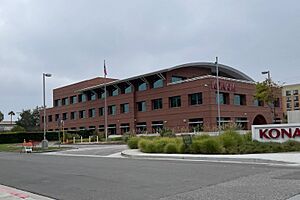
Konami announced a major restructuring of Konami Digital Entertainment on 25 January 2021, which including the dissolution of its Product Divisions 1, 2, and 3 to be reconsolidated into a new structure to be announced at a later time. Konami affirmed this would not affect their commitment to video games and was only an internal restructuring. On 1 July 2022 Konami changed their corporate name again from Konami Holdings Corporation to Konami Group Corporation.
In April 2023, Konami announced that it has opened a new studio in Osaka, Japan. The new offices, located in the Umeda Sky Building south building, will support the developer in its efforts both grow and endure over the coming decades. Konami suggested that the new building would be a core entity in the studio's current and future projects, noting that it hopes Konami Osaka will encourage "sustainable growth" over the next 50 years.
In February 2024, Konami Digital Entertainment announced the establishment of its own anime studio called Konami Animation. The studio will invest the CG technology and know-how it fostered from game development into animation, and it plans not only to work on Konami's own intellectual properties but in other properties as well. Its first work was a PV for Yu-Gi-Oh! 25th anniversary.
Corporate structure
Japan
- Konami Group Corporation
- Konami Digital Entertainment Co., Ltd.
- Konami Sports & Life Co., Ltd.
- Konami Amusement Co., Ltd.
- Konami Real Estate, Inc.
- KPE, Inc.
- Konami Manufacturing and Service, Inc.
- Konami Facility Service, Inc.
- KME Co., Ltd.
- Takasago Electric Industry Co., Ltd.
- Digital Golf, Inc.: On 20 January 2011, Konami Corporation announced the acquisition of Digital Golf via share exchange. Digital Golf became a wholly owned subsidiary of Konami. The exchange became effective on 1 March 2011.
- Internet Revolution, Inc.
- Biz Share Corporation
- Combi Wellness Corporation
- The Club At Yebisu Garden Co., Ltd.
Australia
- Konami Australia Pty Ltd (established in 1996)
America
- Konami Corporation of America: Current U.S.-based holding company.
- Konami Digital Entertainment, Inc.: former American holding company, formerly Konami of America Inc., Konami Corporation of America. On 13 October 2003, Konami Corporation of Redwood City, California, announced it was expanding its operations to El Segundo, California, under the new name of Konami Digital Entertainment, Inc. The Redwood City operations have since been consolidated to El Segundo in 2007 and moved to Hawthorne, CA in 2021.
- Konami Gaming, Inc. in Paradise, Nevada.
- Konami Cross Media NY
Europe
- Konami Digital Entertainment B.V.: European-based holding company.
- Konami Digital Entertainment GmbH: former holding company Europe, formerly Konami Limited, Konami Corporation of Europe B.V. On 31 March 2003, Konami of Europe announced it would be renamed as Konami Digital Entertainment GmbH at the start of Konami's new financial year, on 1 April 2003.
Asia
- Konami Digital Entertainment Limited (科樂美數碼娛樂有限公司): Established in September 1994 as Konami (Hong Kong) Limited. Korea and Singapore divisions were established in October 2000. In June 2001, the company changed name to Konami Marketing (Asia) Ltd. (科樂美行銷(亞洲)有限公司). In March 2006, the company was renamed Konami Digital Entertainment Limited.
- Konami Software Shanghai, Inc. (科乐美软件(上海)有限公司): Established in June 2000.
- Konami Digital Entertainment Co. (주식회사 코나미 디지털 엔터테인먼트): South Korea-based game producer and distributor, originally established as the Korea branch of Konami Digital Entertainment Limited. On 1 May 2008, it became a separate company, and inherited the existing operations of the former Korea branch in June 2008.
On 7 November 2005, Konami Corporation announced restructuring Konami Corporation into a holding company, by moving its Japanese Digital Entertainment Business segment under Konami Corporation. The Digital Entertainment Business became Konami Digital Entertainment Co., Ltd. The newly established Konami Corporation was expected to begin operation on 31 March 2006.
Konami Digital Entertainment
 |
|
|
Native name
|
株式会社コナミデジタルエンタテインメント
|
|---|---|
| Subsidiary | |
| Industry | Video games Publishing |
| Founded | March 31, 2006 |
| Headquarters |
Ginza, Chūō, Tokyo
,
|
| Parent | Konami |
| Subsidiaries | Konami Animation Konami Digital Entertainment, Inc. Konami Digital Entertainment GmbH Konami Digital Entertainment Limited KME Co., Ltd |
Konami Digital Entertainment Co., Ltd. (株式会社コナミデジタルエンタテインメント, Kabushiki-gaisha Konami Dejitaru Entateinmento) is Konami's Japanese video game development and publishing division founded on 31 March 2006. Before Konami Corporation had formally changed to a holding company in 2006, various forms of Konami Digital Entertainment companies had been established either as holding company or publisher. The last of the company, the Japan-based Konami Digital Entertainment Co., Ltd., was split from Konami Corporation during the holding company restructuring process.
Subsidiaries
- Konami Digital Entertainment, Inc.: North American division, established on 13 October 2003.
- Konami Digital Entertainment GmbH: European division, established on 1 April 2003.
- Konami Digital Entertainment Limited: Hong Kong division. Established in September 1994 as Konami (Hong Kong) Limited. In March 2006, it was renamed to Konami Digital Entertainment Limited.
- KME Co., Ltd (KME Corporation): music division established on 1 October 2010.
- Konami Animation: Anime studio established in 2023.
Technology
Former subsidiaries
Konami Computer Entertainment Nagoya, Inc. (KCEN), founded on 1 October 1996, was dissolved along with Konami Computer Entertainment Kobe, Inc. (KCEK) in December 2002.
On 16 December 2004, Konami Corporation announced Konami Online, Inc., Konami Computer Entertainment Studios, Inc., Konami Computer Entertainment Tokyo, Inc. and Konami Computer Entertainment Japan, Inc. would merge into Konami Corporation, effective on 1 March 2005.
On 22 February 2005, Konami Corporation announced Konami Media Entertainment, Inc. would merge into Konami Corporation, effective on 1 March 2005. On 11 March 2005, Konami Corporation announced Konami Traumer, Inc would be merged back into Konami Corporation, effective on 1 June 2005.
On 5 January 2006, Konami Corporation announced the merger of Konami Sports Corporation merged with its parent company, Konami Sports Life Corporation. The parent would be dissolved under the merger, and Konami Sports would become the wholly owned subsidiary of Konami Corporation after share exchange between KC and KS. After the share exchange, KS would be renamed Konami Sports & Life Co., Ltd. On 28 February 2006, Konami Sports Corporation merged with its parent company, Konami Sports Life Corporation, and became Konami Sports Corporation.
On 21 September 2010, Konami Corporation announced it has signed an agreement to acquire with Abilit Corporation via share exchange. After the transaction, Abilit Corporation became a wholly owned subsidiary of Konami Corporation, effective 1 January 2011. On 1 January 2011, Abilit Corporation was renamed to Takasago Electric Industry Co., Ltd. As part of the acquisition, Biz Share Corporation also became a subsidiary of Konami Corporation.
Megacyber Corporation
On 2 October 2006, Konami Corporation announced it had completed the acquisition of mobile phone content developer Megacyber Corporation.
On 6 February 2007, Konami Corporation announced Megacyber Corporation to be merged into Konami Digital Entertainment Co., Ltd., with Konami Digital Entertainment Co., Ltd. being the surviving company, effective on 1 April 2007.
Video games
Major titles by Konami include the action Castlevania series, the survival horror Silent Hill series, the action shooter Contra series, the platform adventure Ganbare Goemon series, the stealth action Metal Gear series, the role-playing Suikoden series, the Bemani rhythm game series (which includes Dance Dance Revolution, Beatmania IIDX, GuitarFreaks, DrumMania, and Pop'n Music, among others), Dancing with the Stars, the dating simulation Tokimeki Memorial series, and football simulation Pro Evolution Soccer.
Konami produced its shoot 'em up arcade games such as Gradius, Life Force, Time Pilot, Gyruss, Parodius, Axelay, and TwinBee. Konami's also licenses games based on cartoons, especially Batman: The Animated Series, Teenage Mutant Ninja Turtles, Tiny Toon Adventures, and the Animaniacs series, but other American productions like The Simpsons, Bucky O'Hare, G.I. Joe, X-Men, and The Goonies, and French comic Asterix all have seen release at some point in the past by Konami either on arcades and/or video game consoles.
Some cinematically styled franchises from Konami are Silent Hill survival horror franchise, and the Metal Gear series. Another successful franchise is Winning Eleven, the spiritual sequel to International Superstar Soccer. In Japan, it is known for the popular Jikkyō Powerful Pro Yakyū series baseball series and the Zone of the Enders games. The company had obtained the rights to Saw from Brash Entertainment when the game's production had been suspended due to financial issues.
Konami is known for its password, the Konami Code, which traditionally gives many power-ups in its games.
Film production
In 2006, Konami started producing films based on their franchises. Konami produced the Silent Hill film (released in 2006) and announced that they will produce a Metal Gear Solid film. On 4 December 2020 Deadline reported that Oscar Isaac will star as Solid Snake in the adaptation, which is currently in development at Sony Pictures with Jordan Vogt-Roberts on board to direct.
Personal computing
In 2020, Konami launched a PC gaming brand in Japan known as Arespear, which includes desktop computers, keyboards, and headsets (the last of which designed in collaboration with Konami's Bemani musicians).
See also
- Good-Feel, an independent video game company founded by former Konami employees
- Treasure, another independent video game company founded by former Konami employees
- Ultra Games, an American shell corporation and publishing label formed by Konami
- Kojima Productions, an independent studio from Hideo Kojima with the same name of the previous Konami production team


